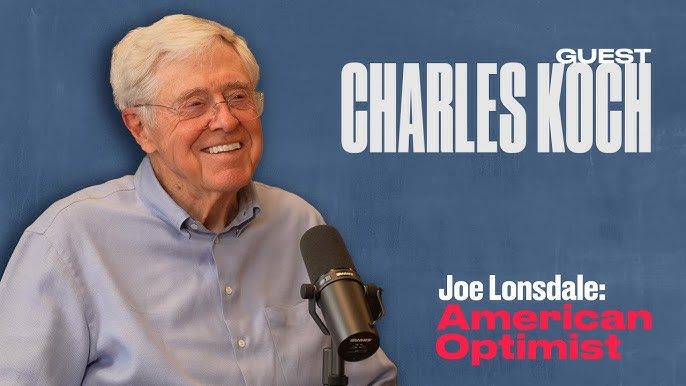Principles That Made Charles Koch a Billionaire
Below is an engaging, conversational Q&A article where Scaled Koch explains the principles that drove its astonishing 10,000-fold growth. The piece is written as if you’re sitting down with the experts at Scaled Koch, learning firsthand how they transformed ambition into an enduring legacy.
First of all, who isWho is Charles Koch?
Charles Koch was born in Wichita, Kansas, in 1935. Growing up in a family with a strong business background, he was exposed early on to practical problem-solving and the principles of engineering. Although details of his formative years remain broadly outlined, it is clear that his early environment instilled in him a determination to innovate and a respect for the value of hard work. His upbringing laid the foundation for a career that would later transform a modest enterprise into a global powerhouse.
Transforming a Small Firm into a Global Conglomerate
Charles Koch’s most significant achievement is his leadership at Koch Industries, a company that under his guidance evolved from a small engineering firm into one of the largest privately held conglomerates in the United States. Through his strategic vision and unwavering commitment to operational excellence, Koch Industries expanded its interests into diverse areas such as refining, chemicals, fertilizers, and consumer products. His business acumen not only drove extraordinary growth but also set new standards for efficiency and innovation in multiple industries.
Q1: How Did It All Begin?
Q: “Scaled Koch, you once set a target for a 70-fold growth by the time of retirement. What inspired such an ambitious goal?”
A: “It started with a simple thought: if we applied these key ideas consistently, just how far could we go? I used a mathematical projection to set the goal at 70-fold. What’s fascinating is that, by rigorously applying our core principles, we surpassed that target—achieving over 10,000 times growth. This isn’t about individual brilliance; it’s about the strength of a disciplined framework that guides every decision we make (Principle Based Management).”
Q2: What Are These Core Principles?
Q: “Could you explain what these principles are and why they matter so much?”
A: “Our principles are the foundation of every strategic move. They’re not just abstract ideas but are tested through real-world feedback. For instance, we focus on value creation, ethical entrepreneurship, and a constant drive for improvement. These principles aren’t static; they evolve as we learn from our successes and setbacks. In essence, our success is a testament to the fact that when a business operates on a robust, principle-driven framework, the outcomes can be extraordinary (Growth Idea).”
Q3: How Do You Keep These Principles Intact Over Time?
Q: “As organizations grow, they tend to drift from their foundational values. How do you ensure that these principles remain intact?”
A: “That’s an excellent question. We face a natural tendency toward disorder—what some might compare to entropy in a closed system. In our context, that means practices can stray from the core principles over time. To counteract this, we engage in continual renewal. We periodically reassess our practices, comparing them to our ideals, and then inject fresh energy and ideas to realign with our core values. This process isn’t one-off; it’s a disciplined, recurring effort that keeps our organization agile (Wikipedia).”
Q4: What Role Does Gap Analysis Play in Your Success?
Q: “Can you talk about how you identify areas for improvement within your organization?”
A: “Absolutely. We conduct what we call gap analysis, which is essentially a systematic evaluation of the difference between our current practices and the ideal state dictated by our principles. Every gap is an opportunity—a chance to challenge the status quo and refine our approach. We ask ourselves, ‘What are we doing right, and where can we do better?’ This constant self-critique drives continuous improvement and innovation. It’s about being honest with ourselves and ensuring that we never rest on our laurels (Holistique Training).”
Q5: How Do You Approach Creative Destruction?
Q: “Some say that clinging to old methods is the enemy of progress. How do you incorporate creative destruction into your strategy?”
A: “Creative destruction is a critical part of our philosophy. It’s about finding a better way of doing things by challenging outdated practices. We don’t shy away from questioning conventional wisdom—even if it means dismantling systems that were once considered sacrosanct. When we find that something isn’t adding enough value, we replace it with innovative solutions. This mindset not only fosters continuous improvement but also keeps us at the forefront of change.
Q6: How Is Mutual Benefit Central to Your Business?
Q: “Many businesses focus solely on profit. How does mutual benefit factor into your decision-making process?”
A: “For us, every transaction must be a win-win. We believe that the true purpose of any business is to create products and services that offer more value than the alternatives available. It’s not just about maximizing profit; it’s about ensuring that both parties in every exchange feel enriched. This focus on mutual benefit lays a solid foundation for long-term success because when your customers succeed, so do you.
Q7: What Is the Biggest Lesson for Aspiring Leaders?
Q: “What advice would you give to leaders who aspire to build sustainable, high-growth organizations?”
A: “The most important lesson is to remain relentless in your pursuit of excellence. Keep challenging your own practices, never assume that past success guarantees future growth, and always be willing to adapt. Embrace feedback, learn from every experience, and ensure that your organization is built on principles that prioritize value creation for everyone involved. That’s the secret behind our exponential growth and enduring impact (Richard Koch).”
Conclusion
This engaging conversation with Scaled Koch reveals that extraordinary growth is not about chance. It’s about setting bold targets, rigorously adhering to time-tested principles, and continuously challenging and refining your methods. Whether you’re leading a start-up or steering a global enterprise, these insights offer a roadmap to sustainable success by emphasizing constant renewal, mutual benefit, and creative disruption. As Scaled Koch reminds us, leadership is as much about maintaining core values as it is about embracing change—an invaluable lesson for any organization aiming to thrive in a dynamic world.



Full Video interview by Joe Lonsdale
